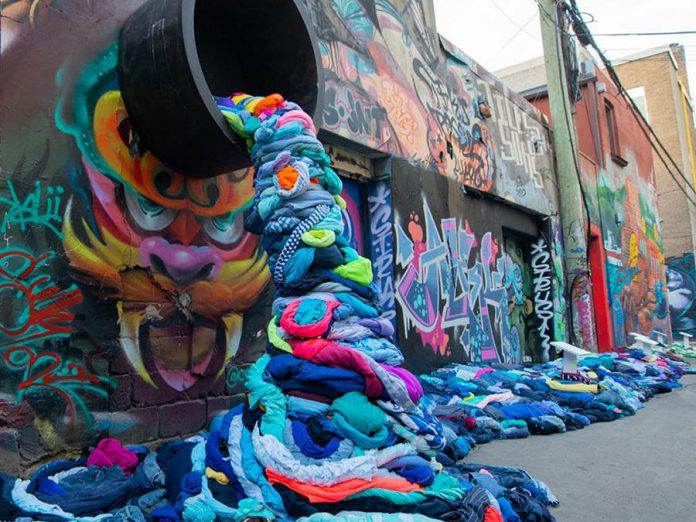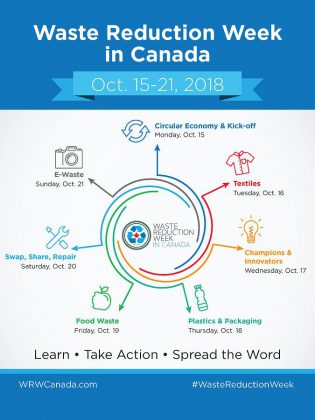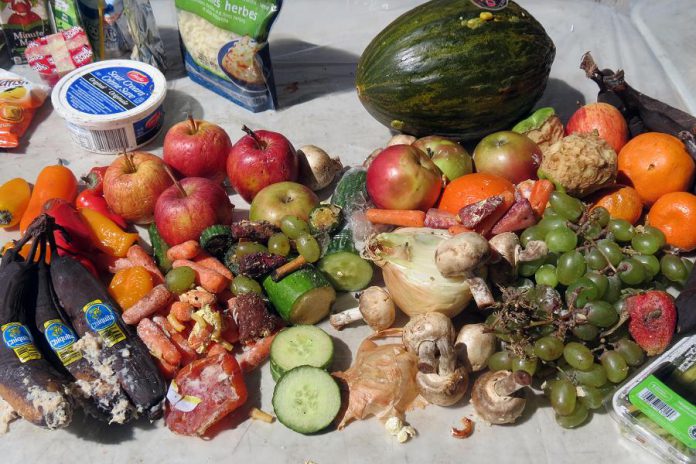
We are what we waste, isn’t that the saying?
With global temperatures rising and landfills shrinking, we are running out of time and space for our garbage. October 15th to 21st is Waste Reduction Week, a time to reflect and educate ourselves about our own bad habits.
Many of us put out the garbage and take our blue bins to the curb and then never think about that waste again. But all that waste goes somewhere — and most of it ends up at the landfill.
“At the current rate, the Peterborough landfill facility will be filled in approximately 13 years,” says James Istchenko, Manager of Environmental Services for the City of Peterborough.
Most of our waste can be avoided if we take the time to carefully plan and to learn how we can change our habits to become less wasteful. From textiles to food waste, plastics, and electronic waste, there are many resources to help us reduce our waste footprint. Awareness is key!
Contaminated recyclables end up in the landfill

Globally, 8.3 million tonnes of plastic has been generated since the 1950s but only 23 per cent has been recovered or recycled.
Aside from eliminating or reducing our use of plastic, we can also improve our recycling rate of plastic by ensuring our recycling is clean when it enters the blue box.
Keeping our recycling clean is important for its end-of-life destination. That spoonful of yogurt or glob of sticky peanut butter left in the bottom of the container can be the difference between it being recycled, or getting redirected to the dump.
When placed in the same bin, one unrinsed jar can contaminate the other items that are perfectly good recyclables. Take an extra minute to rinse your containers before they go in the blue bin to ensure your recycling stays out of the landfill.
Unwanted clothing doesn’t belong in the garbage
Did you know that each of us throws out 82 pounds of clothes every year? Clothes can easily be mended, passed on, or donated. There are many clothing donation locations in Peterborough, including the OPIRG Free Market, located at Sadlier House, 751 George Street North.
“Each year we collect approximately 70 large recycling bins worth of reusable textiles,” says Sam MacAndrew, Coordinator of OPIRG Peterborough.
“This year, we are working towards removing the stigma around used clothing and visiting spaces such as the Free Market. We need to change our attitude towards used clothing and encourage shopping second-hand. It is not about being of a lower socioeconomic status, but rather it’s about reusing the products that already exist.”
Discarded food makes up 14 per cent of what goes into the landfill
If food waste were a country, it would be the third largest polluter, following the United States and China. At a recent event centered on local food waste, the County of Peterborough provided a local perspective on community food waste, as captured by their annual waste audits. Although their findings are a snapshot in time, the results were surprising.
For example, at the household level, one audit showed that we throw away 1.28 kilograms of wasted food each week, costing us approximately $7. That may not seem like much, but over a one-year period the average annual wasted food expense is closer to $1,500 per household. This does not include the annual cost of discarding this food with garbage pickup, which costs $382 per residence.

Of the 42,000 tonnes of waste dumped into the Peterborough landfill each year, approximately 5,880 tonnes is wasted food. That is 650 garbage truck loads of wasted food!
The value of food thrown away in the City and County each year is $30.6 million. Other than vegetable and fruit scraps, the big wasters are uneaten leftovers and plate scrapings, spoiled produce, and food past its best-before date. This is easily avoidable by making meal plans and grocery lists, buying only what you will eat, and loving your leftovers!
Waste increases carbon dioxide and contributes to climate change
Waste not only costs us money, but it contributes to climate change.
“When it comes to waste, we also need to think of carbon dioxide,” explains local author and naturalist Drew Monkman. “It too is a waste product. Simply releasing CO2 into the air is akin to littering, but because it is both invisible and odourless, we don’t see it littering the sky.
Recently, the Intergovernmental Panel on Climate Change (IPCC) issued a special report on the impact of global warming stating that even one extra single degree of heat could make a life-or-death difference in the next few decades for ecosystems.
Although we may not be aware of the impacts of contaminating our recycling, or throwing out food, we are contributing to climate change.
“The impact of waste on climate change is devastating,” Monkman says.
It’s time to change our behaviour
It’s time to change our behaviour when it comes to waste.
Behaviour change can be difficult and takes time. Fortunately, there are great resources for the City of Peterborough to help us develop better habits.
If you are unsure if a product is recyclable, you can visit the City of Peterborough Waste Management site and use the What Goes Where tool to learn what is recoverable. Additionally, you can download the tool as an app, making recycling that much easier.
Visit foodinpeterborough.ca for ideas on how to reduce your household food waste. As a community, we can work together to divert waste from the landfill, prolonging it’s life.
Let’s change the predicted life of our landfill from 13 years up to 20!
For more information about Waste Reduction Week, visit wrwcanada.com. For more information, ideas, and products to help you lower your waste footprint, visit the GreenUP Store at 378 Aylmer Street North in downtown Peterborough.


























